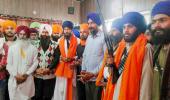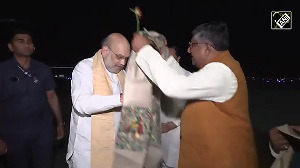Almost all will say no.
Then ask them why they don't push back at those who rise the slogan of Khalistan.
Somebody would confront you with a counter-question: If people can talk of a Hindu Rashtra, why get so upset if others talk of a Sikh Nation, points out Shekhar Gupta.

If only I were granted just 10 minutes of some divine power to ask you to repeat after me the following lines three times:
- There is no such thing as the Khalistan movement, dream, or idea. Definitely not in India. What happens in Brampton, Canada, is a problem for the Canadians.
- Nobody, or almost nobody, in India's Punjab wants a return to the murderous 15 years from 1978 to 1993, especially the deadly 1983-1993 decade.
How do India's Sikhs feel about their country? Check out the data from a 2021 Pew Research Center survey, which found that 95 per cent of Sikhs in India are proud of their country.
No community in India, regardless of its size, holds a monopoly over nationalism.
No community, however microscopic, can be subjected to any questioning of its national commitment.
- Politics in Punjab is alive, lively and credible. People vote in growing numbers and change their governments.
There is no political or emotional vacuum for the emerging dark forces, mostly in Canada, to wade into.
When Punjabis become unhappy with their situation, which will be often, they will vote out their government.
They won't turn to someone like Justin Trudeau or Gurpatwant Singh Pannun to seek help for a regime change.
And then the fourth, and the most important, if I could ask you to repeat after me:
- I shall never question the patriotism and national commitment of India's Sikhs. Never. Because a few hundred assorted criminals have never made a revolution.
That said, and repeated multiple times, let us also admit that there are problems.
That there is widespread anger and frustration in Punjab today, especially among the Sikhs.
It manifests in anti-sacrilege protests, rising religiosity and conservatism, a growing defensiveness over the new definitions and tests of patriotism they are subjected to, especially on social media and some TV channels.
There's a dangerous alienation. This alienation, however, is not from their nation, but from what they see as their national politics.
Anger and frustration at Punjab's economic decline relative to the more progressive, industrialising and mostly coastal states is easy to understand.
When a state goes from being number one (among states with a population of one crore/10 million or more) to number 13 in about 20 years, it not only hurts its people economically, but also damages their self-esteem.
That's particularly traumatic for a community used to being so dominant.
Punjab is caught in an agrarian trap while many other big ones have broken free with growing industry and services, particularly IT-enabled services.
To understand this better, we need to take a closer look at the Sikh diaspora, especially in Canada.
In 2020-2021, the last year for which full data is available, India received the equivalent of $80.2 billion in foreign remittances.
The US topped the list with 23.4 per cent of all remittances, followed by the UAE, the UK, Singapore, Saudi Arabia, Kuwait, Oman and Qatar (only 1.5per cent).
Did we forget Canada, you might ask? Don't we have such a large, prosperous and happy Punjabi (mostly Sikh) community there?
The data gives you an insight into the politics and the deeper crisis, both in our Punjab and Canada's many little Punjabs.
Remittances from Canada from the nearly 1 million Punjabis (800,000 of them Sikh) to their homeland rank at number 12, behind Hong Kong, Australia and, for heaven's sake, Malaysia.
It is a mere 0.6 percent of the total figure.
What does this tell us? I'd hazard to say two things, one tangible and the other a conjecture.
The first is that the Sikhs in Canada are still employed in lower-wage jobs, or really small businesses that do not produce enough surpluses to send home.
This is unlike the many white-collar employees in the US, the UK and even the UAE and Saudi Arabia.
On the skills and employment value chain, the Punjabis have fallen behind their peers from India's south and west.
Punjab is trapped in a peculiar irony. Its people are not poor. The state has among the lowest poverty scores in the country.
However, its economy is mostly agrarian, farms produce some surplus but the young no longer want to work on them.
That is done by cheap labour imported from the Hindi heartland, mainly Bihar and eastern Uttar Pradesh, the so-called 'bhaiyyas' in Punjab.
At the same time, Punjab's own young people spend years, burning through family savings, begging, stealing and borrowing to somehow get to Canada.
Where they are needed for precisely the same kind of jobs that they hire their bhaiyyas for.

This also brings us to the less tangible reason, besides low surpluses, that remittances from the Sikh diaspora in Canada are so tiny.
It is that a lot of money is sent back to families through informal channels.
It is needed to pay for the emigration (almost entirely to Canada) of other members of the family.
The current going rate in Punjab is upwards of Rs 50 lakh (Rs 5 million). This isn't the kind of activity for which you pay by cheque or bank transfer.
It is classical, if voluntary, human trafficking.
Punjab achieved its peace by 1993. The peace has been so total that the state is safer than anywhere in the Hindi heartland.
If its people haven't seen a real peace dividend yet, it is a massive failure on the part of its political class.
This fuels anger and frustration. That is, however, topped by something more troublesome: Apprehension over our national politics and the Sikhs' place in it.
Not only do the Sikhs see themselves as marginalised, especially after the Bharatiya Janata Party-Akali break-up, they also fret over the rise of the BJP, Hindutva and the rising clamour for a Hindu State.
Come with me for a walk around Punjab and ask a Sikh young or old if they want Khalistan.
Almost all will say no, unless someone blessed with a really wicked sense of humour wants to pull your leg.
Then ask them why they don't push back at those who rise the slogan of Khalistan.
If you ask just a few Sikhs on any street, in any village, soon enough somebody would confront you with a counter-question: If people can talk of a Hindu Rashtra, why get so upset if others talk of a Sikh Nation.
If you can create a nation on the basis of one religion, why not for another?
The rise of this all-powerful BJP, the lack of representation for the Sikhs, especially Punjab's Sikhs, the isolation of the Akali Dal, and what they see as victimisation of the Muslim minority has caused a deep influence on the mood in Punjab.
You can live in denial if that makes you comfortable, but not for long.

Remember how the Sikhs in Gurugram offered their gurdwaras to Muslims denied permission to offer namaaz in the parks?
Or the bonhomie at the langars Muslim activists organised for the Sikh farmers at protests outside Delhi?
The BJP miscalculates gravely when it presumes that the Sikhs still carry their antagonisms for the Muslims going back to the times of the great Gurus or even Partition.
The Sikhs think they got even, and do not see a threat any longer.
Besides, religion is not their only determinant of identity.
There's also language and culture.
They have much in common on these counts with the vast majority of Punjabis in Pakistan.
Will they not be in the vanguard again if Pakistan goes to war against India once more? Of course, they will.
They have much in common with Hindus, but it's a grave error to count them as such in a polarised India.
Seventy-seven per cent of all Indian Sikhs live in Punjab.
The same PEW survey that tells us that 93 per cent Sikhs are proud of living in Punjab and 95 per cent are proud to be Indian, underlines another important data point.
That eight out of 10 Sikhs see communal violence as a big problem in the country.
That is more than just a bit higher than Hindus and even Muslims, at 65 per cent.
It is the BJP/RSS politics' failure to see and appreciate this nuance that's adding to frustration and anger in Punjab.
This is what the renegades in Canada are playing with.
By special arrangement with The Print
Feature Presentation: Aslam Hunani/Rediff.com












 © 2025
© 2025